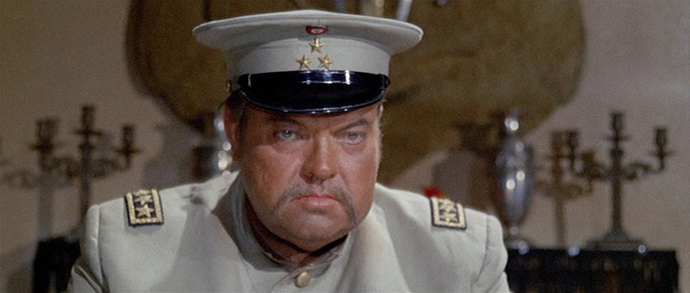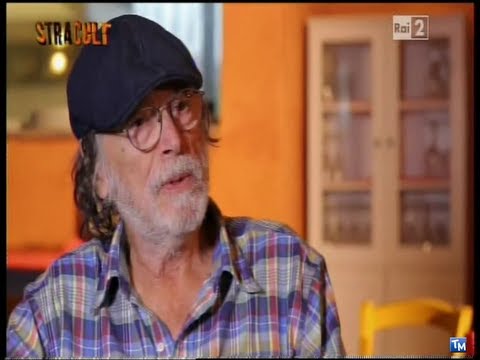He’s in a hundred movies, about half of which are rated lower than Tepepa.
Well, I enjoyed Welles’s performance in Tepepa.
“‘A few days before, one of us died from a whipping.’ Et cetera, et cetera, et cetera. The rest is of no interest.”
That doesn’t improve his acting in Tepepa.
Of course I haven’t seen all the mediocre films in which Welles wasted his later acting career, so there might be other equally bad acted films, but what hid did (or not did) in Tepepa is a shame.
Well, he’s not the only US actor who made pitiful appearances in European films. It made me sad to see this genius so completely disinterested, especially as Tepepa was not a hopeless and helpless film like God’s Gun.
Milian recalls his conflictual experiences on set with Gian Maria Volonté (Face to Face) and Orson Welles
From 20:00 to 25:30
Another anecdote on Welles, shows that Orson put some work into Tepepa
From 14:40 to 18:40
It’s hard to know exactly what the issue was for Orson Welles with Tepepa. Rumour has it that he called Milian “a dirty little Cuban” but Milian still mentions him fondly in interviews so it can’t have been to his face because I think he’s the type of character that would have reacted to that. It was a lazy performance but that may have been down to Welles’ condition as he was in poor shape by this stage of his career, but i still really like the film even though Welles pretty much disowned the picture from his filmography.
In Federico Caddeo’s featurette Freude und Revolution (“Joy and Revolution”) on the Koch Media DVD of Tepepa, Giulio Petroni states that his relationship with Orson Welles on and off the set was very good, amicable, but that Tomás Milián had problems with Welles. Asked whether Welles was difficult to work with, Milián replies, “He was very difficult, yes, he was. But I am very difficult, too. I’m more difficult than he is.” And Milián says, that although it was obvious that Welles accepted the role in Tepepa only because he needed the money and not because he wanted to be in a Western movie shot in Spain, he (Milián) practically forced him to give his best. “I just grabbed him by the balls, not literally, and had a talk with him.”
Alex Cox writes that Welles’s “performance in Tepepa is remarkably good. […] he brings real conviction, and literal weight, to the role. Orson Welles’s acting in Tepepa has been unjustly neglected, I think. […] he gives a fine performance.” (10,000 Ways to Die, p. 208)
I think Cox is very wrong about this. 
Welles was an incredible actor in his best films, and I see nothing, absolutely nothing from that in Tepepa.
Its a fine line between subdued to uninterested. I think that Welles kinda off key, quiet performance was a good contrast to Milians more dramatic turn. I just like the film anyway.
It might not be a western, litterally speaking. But it’s certainly a SW. How do you think it differs from the films you mention?[quote=“Companero_M, post:142, topic:532”]
Well, I enjoyed Welles’s performance in Tepepa.
[/quote]
So did I.
Welles was in it for a quick “beer” cheque in my view, and by the looks of him in the film he may have spent it all as he looked drunk in the film to me.
I think he is referring to scenes like the train attack and the machine gun in A Bullet for the General, the duel between Yodlaf and El Vasco, a few gunfights and the buried to the neck ingredient in Companeros and of course the Arena sequence in The Mercenary.
JonathanCorbett answered it for me.  I’d class this as an Italian drama set during the Mexican revolution.
I’d class this as an Italian drama set during the Mexican revolution.
That describes it well. And that is different from a positive underplaying of a role.
So without a train attac, a machine gun, a duel or something like that, no spaghetti western? Hmm… Well actually, I think I see what you mean. But I don’t agree. I think Tepepa belongs in a group of films together with the three films mentioned and Corri, uomo, corri. Plot-wise, thematically and in other respects they are very similar and closely linked. If we were not to consider Tepepa a SW, none of these films should be counted as such. By the way, I think Petroni would agree with you …![]()
Damiano Damiani, for instance, vehemently opposed the categorization of ¿Quién sabe? as a Western movie: “[It is] a film about the Mexican Revolution, set in the Mexican Revolution, and therefore it is clearly a political film and nothing else.” (Quoted in Austin Fisher’s Radical Frontiers, p. 121.)
I think that is what Corbucci would term “Zapata Spaghetti”
Yes, or Zapata Westerns. Fisher identifies these films within the genre as an “‘insurgency’ variant” which he describes as “a melting-pot of political and cinematic references, incongruously fusing the tropes of Italian political cinema with those of the American Western.” (Radical Frontiers, p. 121)
Yeah, but then he shouldn’t have directed so many scenes in a western style. As did Petroni.
But Corbucci’s revolution westerns are of course much closer to the genre. And more honest because of that.
Essentially it comes down to someone making a superior film in the genre and then not wanting it to be associated with all the other dregs of the genre. Even Leone did his very best to avoid having his films associated with any of the other SWs. Corbucci was pretty exceptional in this regard in that he did not seem to have any issue with even the best of his work being associated with the genre.
And Petroni, likewise, stated (in the introduction to the Koch release) that Tepepa is no classic Italian western filone film, no spaghetti western, but in a completely other genre, a film with social intentions, a film which not in any case should be mistaken for an Italian western film.
Still, I think there is nothing to be gained by excluding these films from the SW genre, just because they have a social or political intention. In that case we would also have to consider Solima’s films, as well as Il Grande Silenzio and others, for that matter.
And, by the way, the body count of Tepepa amounts to at least 76, a little more than in the average Italian drama…


